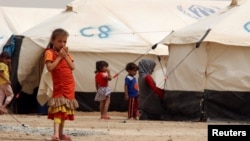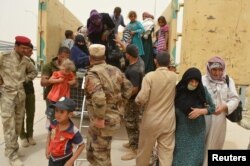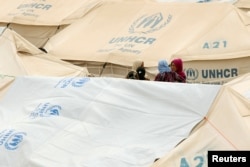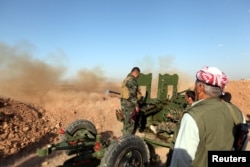Aid agencies, aware of the recent massive failure to help families fleeing the fierce fighting in Fallujah, are strengthening their plans for the expected military operations on the IS stronghold of Mosul city.
In May and June this year, after being held under siege for months, roughly 85,000 people fled Fallujah in a matter of days, swamping Iraqi government and aid agencies’ ability to help.
The result was tens of thousands of people left without enough food, drinking water, shelter, medical supplies or latrines, in searing summer temperatures of 48 degrees C. or higher.
Many men and boys ended up in security screening centers without food, water or toilets. Hundreds simply disappeared.
Aid agencies warn that those events “will be dwarfed by the access and protection challenges civilians will face when the anticipated military operations on Mosul begin, with over 10 times as many people expected to flee.”
Humanitarian agencies are worried for the safety of the civilians living there, how they will escape, and how they will be received.
“The humanitarian fallout is bound to be catastrophic unless funding and resources are prioritized to help up to 1.2 million civilians,” the Norwegian Refugee Council and the International Rescue Committee warned in a statement.
Some 20,000 civilians have already been displaced from areas southeast of Mosul during recent Iraqi and Kurdish military operations to advance on the IS-controlled city.
Race against time
Civilians have mainly fled to already-crowded camps in Debaga, east of Mosul, others have tried to find safety on the Syrian border.
“We are in a race against time to ensure lifesaving aid is ready so families that flee the planned military offensive don’t step from one hell into another,” warned NRC Secretary-General Jan Egeland.
“Once the final battle begins, it is too late to start mobilizing relief. We failed the Iraqi people when they fled from Fallujah. It is inexcusable to make the same mistake again,” Egeland said.
Mosul, Iraq’s second largest city, is largely Sunni and is considered the Iraqi “capital” of the Islamic State’s so-called caliphate. As many as 8,000 IS fighters are said to have been gathered to fight for the city, many of them Iraqis who are familiar with the terrain.
On the other side of the frontline, thousands of Iraqi forces, Iraqi Kurdish peshmerga forces, armed Sunni tribes, and the U.S.-led coalition are preparing to throw their fire power toward liberating the city.
Learning from mistakes
In Fallujah, Iraqi government and military attempts to create safe corridors for civilians to flee the fighting stalled. Instead, families found they had to run a gauntlet of bombs and bullets to get out of the city. Once out, families were often separated as men were taken for questioning.
IRC Iraq Country Director Aleksandar Milutinovic said the same mistakes should not be repeated in Mosul.
“Planning must begin immediately to guarantee routes out of the city will really be safe and free of landmines, security screenings should avoid separating families and emergency funding must be made available to properly stock displacement camps and reach everyone in need,” Milutinovic said.
Because Islamic State is largely Sunni-based, and its control in Iraq has flourished among Sunni populations disaffected by repressive Shi’ite governments, many Sunnis fear how they will be treated during the security screenings and what will happen to them if Iraq’s heavily Shi’ite Popular Mobilization militia are involved in the operations.
U.N. envoy for Iraq, Jan Kubis told the Security Council last week that since the May 22 start of the military operation in Fallujah, the United Nations had received credible reports of human rights violations and crimes.
These included “torture and killings, disappearances, and other allegations of mistreatment of those detained, committed by elements of the popular mobilization forces and the Iraqi security forces operating in the Fallujah area,” Kubis said.
He noted that 643 men and boys remain missing since June 5, after they were intercepted by mobilization-affiliated forces while leaving Saqlawiyah, just northwest of Fallujah.
UNAMI also has registered statements supporting claims that 95 men remain unaccounted for after they were intercepted by forces affiliated to popular mobilization forces while leaving their homes on May 25.
“Those lessons from Fallujah shall be taken into account while planning liberation of Mosul,” Kubis said.
Just as important, Kubis said, was the need for Iraqi political and community leaders to work on a post-IS reconciliation, to ensure the conditions that gave rise to the extremist militants are not perpetuated.
“Sustainable peace and security can be achieved only with a historic compromise that puts an end to the divisive policies of intolerance, inequality, and political and social injustice,” he said.








